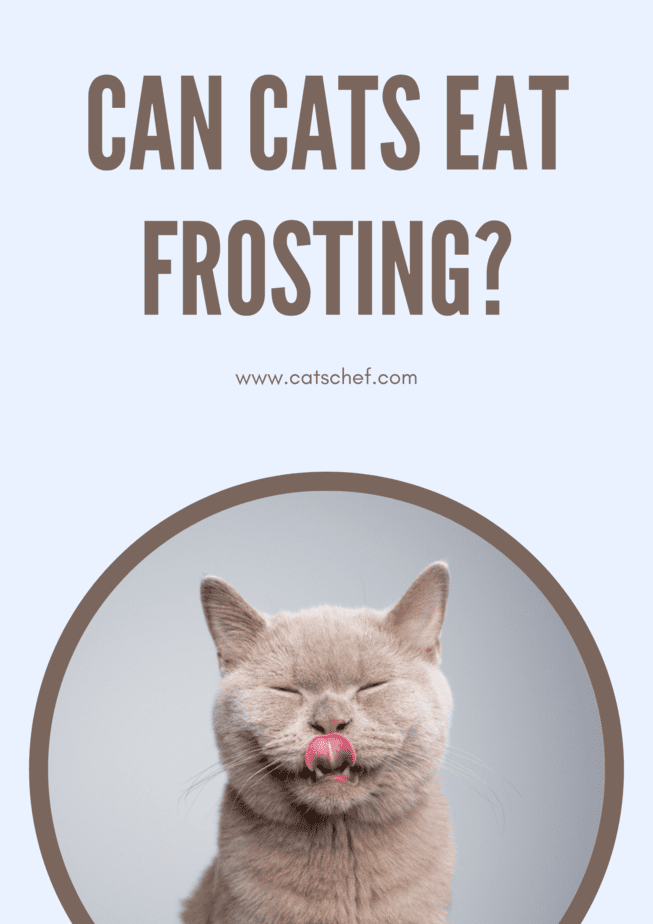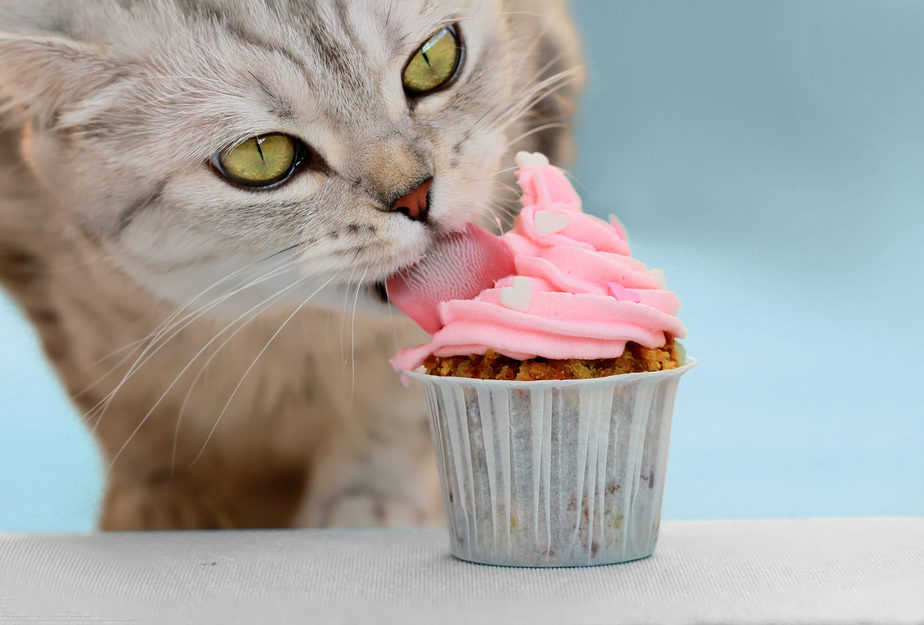This fluffy, thick spread gives additional flavor to cakes, cupcakes, and other sweets. It adds to the appearance of the treat as well. You may have seen pet owners getting their furkids cupcakes and certain cookies for their birthdays. But can cats eat frosting with them or should they stick to plain treats?
The frosting is sometimes misjudged for icing, which are two different things. Icing dries up quickly and has a hard texture. Frosting, on the other hand, is fluffy because it’s made from whipped toppings.
It’s lighter than icing and can even be used to cover up the whole cake! However, as nice as it would be to throw a big birthday party for your pet, perhaps frosting shouldn’t make it onto the list of celebratory items.
Generally, cats shouldn’t be eating sweets such as cake, with or without toppings/frosting. These foods can’t meet their nutritional needs and furthermore, both you and your furkid could regret those large portions of frosting when you see yourselves in holiday pictures!
Can cats eat frosting? Is it dangerous to felines?
There is no straightforward answer to this question, but we can all agree that your cat is better off without it. The ingredients found in frosting can be detrimental to your cat’s health. But not to worry, if she steals a lick or two when you’re not looking, she should be fine.
Other than that, you should refrain from feeding her any frosting or icing. Whether it be for a birthday picture or just out of your pure curiosity, leave the frosting for the human guests.
Common frosting that’s used for all kinds of pastries include ingredients such as sugar, butter, milk, and heavy cream. Other additional ingredients are used for adding more flavor, color, or details.
These involve vanilla extract, eggs, and even artificial sweeteners. Apart from eggs, none of these are recommended for your pet’s intake, so even if cats can eat frosting on occasions, they really shouldn’t.
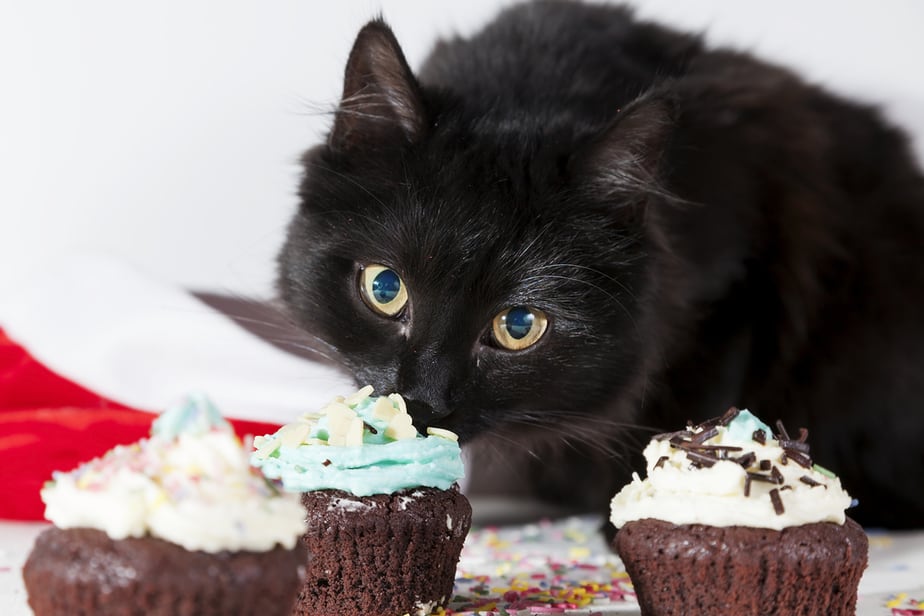
1. Can cats eat frosting because of dairy?
There’s this well-known misconception that felines drink milk. And in some recipes for the perfect frosting, you can find milk as an ingredient. Unfortunately, this isn’t the best option for your pet because believe it or not, she’s lactose intolerant.
Cats have a hard time breaking down lactose, the sugar found in milk, hence the term lactose intolerance. Because of these digestive struggles, after drinking a bowl of milk, you may find your pet having some stomach issues.
The lack of an enzyme called lactase, which helps in digesting sugar, sets your cat’s digestive tract up for failure. This can result in gastrointestinal problems such as diarrhea and vomiting. Just as some humans are lactose intolerant, so are felines.
Other ingredients that contain dairy and can be found in the frosting are butter and heavy cream. Butter has a lower amount of lactose than milk, but it still isn’t entirely safe for feline consumption. It’s high in saturated fats which are unhealthy for both humans and cats.
These fats lead to obesity and can cause similar digestive issues as milk does. When it comes to heavy cream, the story doesn’t change a lot. Just like sour cream, your furball will be tempted to have a lick or two because of all the fats found in it.
Other than that, these dairy products contain small amounts of healthy nutrients. However, they don’t play an important role in your cat’s diet because they’re not easy to break down, so these nutrients are more likely to go to waste.
2. Sugar and other sweeteners
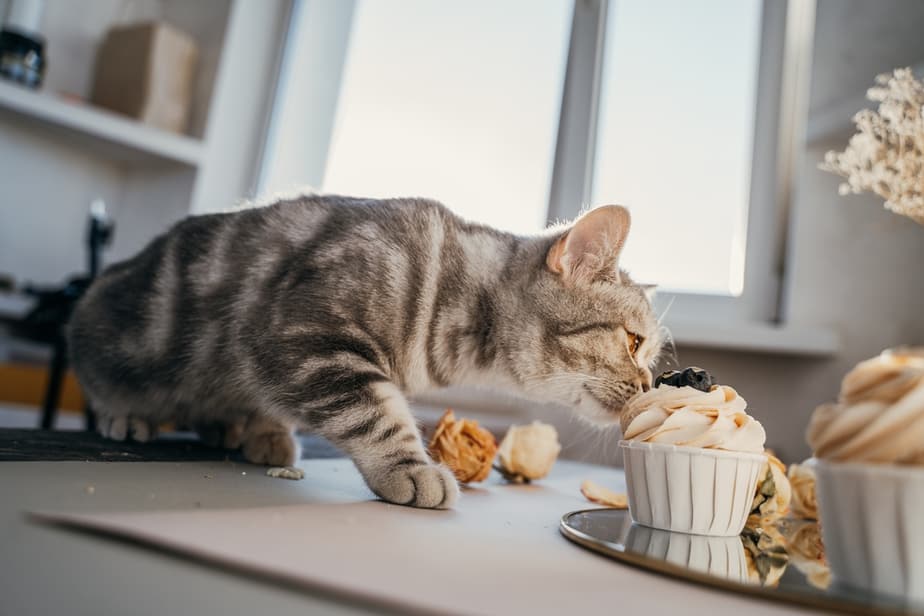
Sugar is a carbohydrate, and cats don’t need it in their diet. Just like dairy, it’s difficult for them to digest. The stomach of your small carnivore isn’t built to break down plant matter, but rather to process meat.
Sugar isn’t harmful to cats, but it does have certain negative consequences. Too much sugar in your cat’s diet can lead to tooth decay and other dental issues. Cats can also become overweight and suffer chronic conditions like diabetes.
A few extra pounds may not seem alarming to you, but is it really worth your pet’s discomfort? Not to mention the burden those pounds put on her joints. For elderly cats, this could be a big problem and lead to the development of arthritis.
3. Artificial sweeteners
Artificial sweeteners and flavorings might cause dental and other health issues as well. Xylitol, a sweetener commonly found in sweets such as gummy bears, can cause vomiting, lethargy, and liver failure in cats.
The name is self-explanatory. Artificial means unnatural and, in the majority of circumstances, unhealthy.
Artificial sweeteners, particularly in sweets like frosting, are commonly utilized nowadays. These are now often used by businesses since they are less expensive than extracting natural juices.
They can be harmful to felines since the substances used in them irritate their stomachs. When xylitol interacts with your pet’s digestive system, it can cause problems. It quickly absorbs into your pet’s bloodstream and causes the pancreas to release insulin. This results in hypoglycemia, or low blood sugar. If left untreated, this condition can be fatal.
There’s no need to fear if she steals a tiny nibble of candy or licks up the frosting off the plate. In the future, keep her away from cake – for her health and your own sanity’s sake.
So, if you’re wondering whether cats can get hurt by eating frosting, the answer is yes.
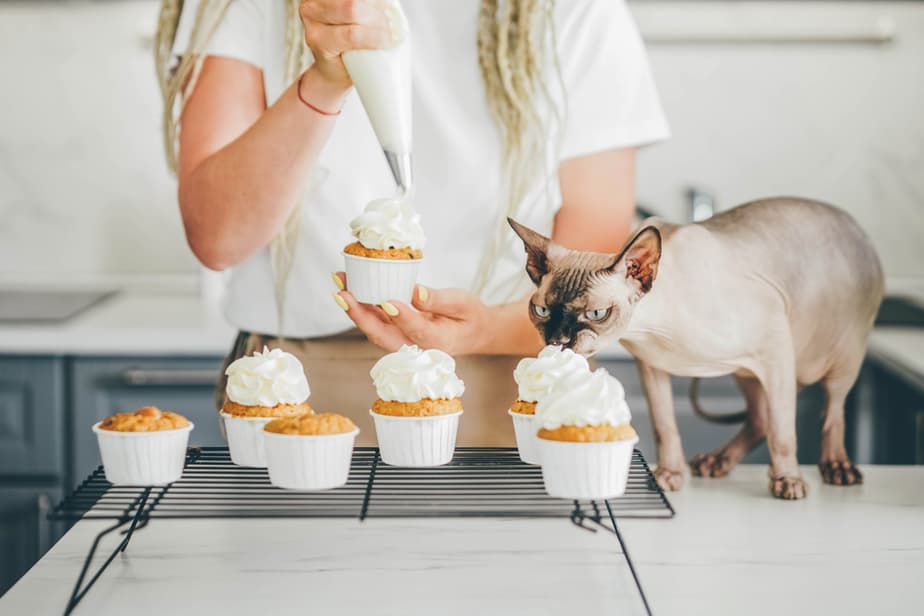
4. What about eggs?
Don’t be alarmed if you’ve ever eaten boiling eggs and spotted your cat sneaking around them. For your feline companion, eggs are a great source of protein. This dish could be a tasty treat for her on occasion.
Felines require protein derived from animals, which includes eggs. As a result, they’re an excellent supplement to your cat’s diet. Feeding her raw eggs is not a good idea, though. Raw eggs can transmit bacteria and germs, making them disease vectors.
The results could be harmful to your cat’s health, as she could become infected with salmonella or E. coli. Make sure you only give her boiled, unseasoned eggs in little amounts. Due to some frosting containing whipped egg whites, the eggs found in them could be a potential threat.
5. Can cats eat frosting with vanilla flavor?
This is a frequent ingredient in frosting and other cake toppings, and it’s one of the reasons you shouldn’t let your cat eat them. Vanilla extract is a fragrant flavoring that is often used in baked products such as cakes, cupcakes, puddings, and waffles.
Frosting, like any other treat that includes this extract, such as vanilla pudding, isn’t the best choice of food for cats. Ethyl alcohol is included in vanilla extract, which can induce alcohol poisoning in cats.
Ultimately, anything with a vanilla flavor can be harmful to your cat’s health. So she’d better get out of that birthday party fast!
Another flavor that rivals vanilla’s popularity is chocolate. However, chocolate isn’t good news either. It’s highly toxic to felines because of its two essential compounds theobromine and caffeine.
Any type of chocolate, whether it be dark or milk, is dangerous for your pet and should be avoided as much as possible. Just like chocolate cake, cats can eat frosting, but not without consequences!
Dangers lurking in frosting
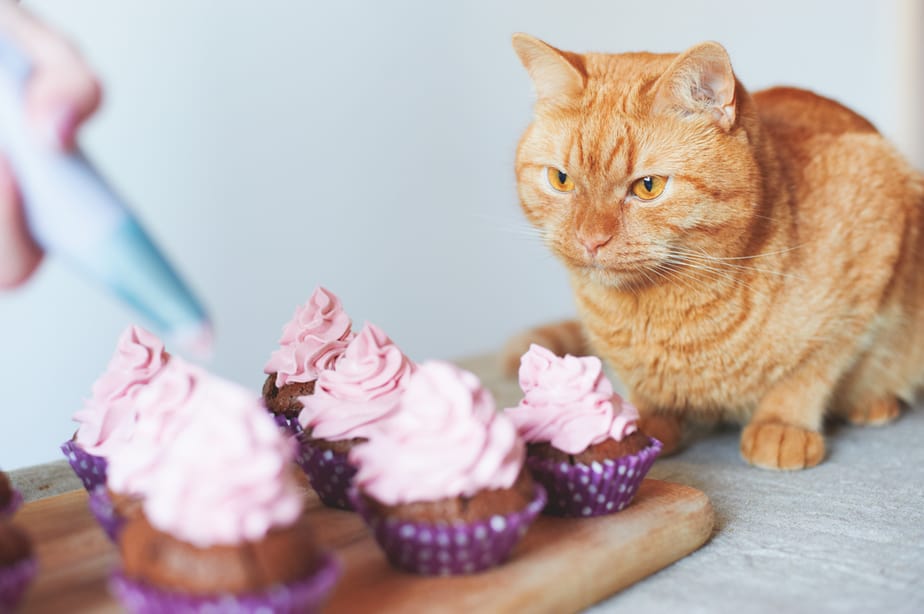
Besides some of the poisonous ingredients such as chocolate and vanilla, the mixture of ingredients used to make the frosting is worrisome. When you put all of them together, you may have a good time, but your furchild isn’t guaranteed the same.
Frostings, as well as any other pastries with this glaze, are calorie-dense and high-fat foods. Felines need a certain amount of calories per day, but any excess intake could be harmful to their health. The outcome is similar to that of any other sugar or carb intake.
This means weight gain, joint pressure, dental problems, as well as other health issues. When it comes to fat count, because of all the dairy products and fats, frosting isn’t the healthiest food for you, let alone your fluff!
Because of the highly saturated fats, consuming frosting, in the long run, could result in bad health. Besides the above-mentioned consequences, high-fat percentage foods are likely to increase cholesterol levels in the blood.
The side effects of this could mean higher risks of heart diseases and stroke. Not to mention how your once agile cat turns into a depressed, inactive pet because of the extra weight.
How can I stop my cat from eating frosting?
If she’s a curious furball, and on top of that, a spoiled one, she’s been having access to human foods for a while now. Now, don’t worry, we’re not here to judge but to help. Besides, it’s not your fault when she bashes her long eyelashes at you.
This is, however, a bad habit. Just like humans have a bad habit of eating junk food and sweets all the time. The good news is that this isn’t something hard to cure, all you will need is some patience, persistence, and high-value cat treats.
If she’s a spider-cat that has no trouble climbing your kitchen counters and soaking her whiskers in frosting and other whippings, you’ll have to be extra careful. You could try keeping some natural cat repellents on your counters such as black pepper and citrus fruits like mandarin oranges.
Instead, treat your lovebug with some cat-appropriate treats that are store-bought. If that doesn’t work, try some small fish like anchovies. You can even go DIY and freeze up fruits and vegetables that she seems to be fond of.
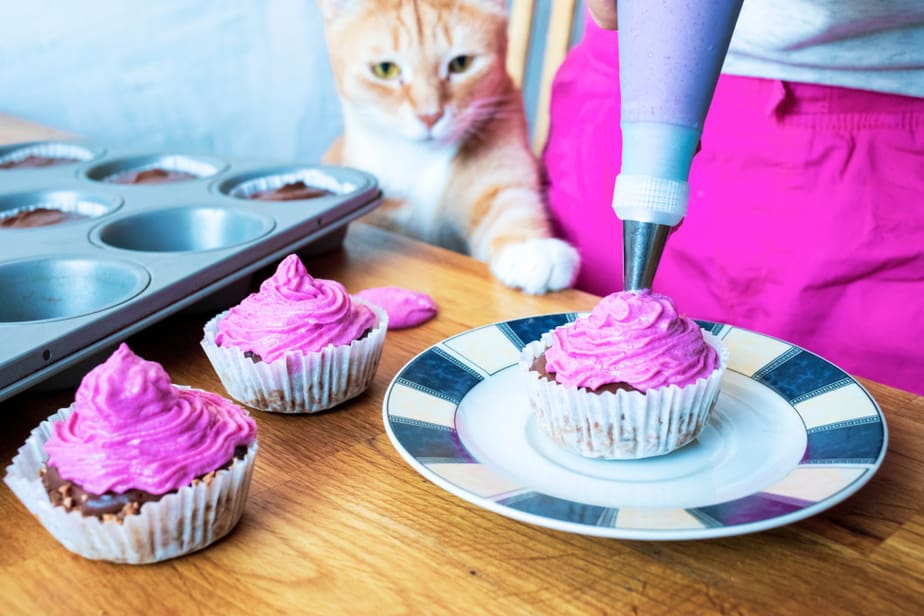
In summary
We know our little pets are curious and stubborn, but for their sake, keep them away from any cakes and frosting. We’re not saying that cats can eat frosting, but a lick here and it isn’t necessarily harmful. Still, you shouldn’t be encouraging this type of behavior.
Frosting contains harmful ingredients that could lead to serious health issues in both the short and long run. To avoid an expensive trip to the vet and rather enjoy your party, leave out the frosting and instead, surprise your pet with some homemade or store-bought, healthy treats.
Read more: Can Cats Eat Whipped Cream? Is This Cats’ Dream?
